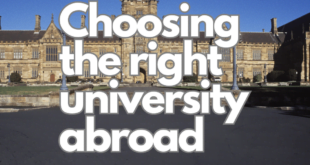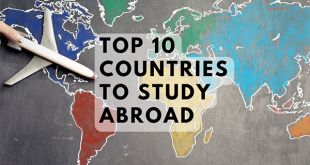Studying abroad is an exciting opportunity to experience different cultures, gain valuable skills, and make lifelong memories. However, with so many options available, finding the perfect program to study can be overwhelming, let alone if it’s abroad. That’s why we’ve prepared this comprehensive guide to help you make an informed decision.
Whether you dream of exploring ancient ruins in Greece, mastering a new language in Japan, or studying engineering in Germany, we’ve got you covered. We will walk you through the essential steps to choose the best study abroad program that suits your needs, preferences, and aspirations.
Table of Contents
What to Consider Before Choosing a Study Abroad Program?
Studying abroad is a significant investment of time, money, and effort. To make the most of your experience, it’s crucial to consider several factors before making a decision.
Your Goals and Priorities
Before embarking on your study journey, it is essential to identify your personal, academic and career goals. Ask yourself what you hope to achieve during your time abroad. Are you seeking an immersive language experience, cultural enrichment, specialized academic courses, or career opportunities in a specific field? Knowing your objectives will help narrow down your options and find a program that aligns with your ambitions.
Location and Cultural Fit
Selecting a destination that resonates with your interests and values is crucial for a successful experience abroad. Consider factors such as language barriers, climate, local culture, safety, and accessibility to travel within the region. Embracing a new culture can be both rewarding and challenging, so be open to exploring diverse settings. Moreover, check travel guides and testimonials to get a sense of each location’s atmosphere.
Program Duration
Study abroad programs vary in length, from short-term summer programs to full-year academic exchanges. Assess your commitments and academic needs to determine the most suitable duration for your program. At the same time consider the program’s duration to see how it fits into your academic timeline. Decide afterward whether a short-term, semester-long, or year-long course suits your needs and goals.
Academic Offerings
The next factor is the academic compatibility between your goals and the programs you are looking into. For that, check the academic curriculum and course offerings. Next is to ensure they align with the major, minor, or specific subjects you wish to study. Moreover, verify if there are any credit transfer policies with your home institution.
Cost and Financial Considerations
Studying abroad may require a significant financial investment. So it’s crucial to carefully evaluate program costs and additional expenses. Consider tuition fees, accommodation costs, travel expenses, and personal spending money. Look also if the program comes with some scholarships, grants, or financial aid opportunities that can alleviate the financial burden. Additionally, look into potential part-time job opportunities if allowed by your study visa to supplement your income while abroad.
Accreditation and Quality Assurance
When evaluating study abroad programs, ensure they are accredited and meet high-quality standards. Accreditation indicates that the program has met certain academic and administrative criteria, ensuring you receive a valuable educational experience. Look for endorsements from recognized international education organizations or universities to ensure the program’s credibility. This step is vital to guarantee a rewarding and academically valuable experience.
Language of Instruction
Determine whether you prefer studying in a program that uses your native language or if you want to challenge yourself with a foreign language. If you’re planning to study in a non-English-speaking country, assess your proficiency in the local language. Some study programs include language courses to help students adapt to the new environment abroad. While immersion in a foreign language can be an excellent way to improve your proficiency, ensure the program offers adequate support for non-native speakers.
Support Services
For a seamless educational experience, consider leveraging any support services that come with your program of choice. This can be orientation, academic advising, housing assistance or any emergency support. Additionally, having a strong support network will ease your transition into the new environment, making your stay abroad more enjoyable. You can also explore any possibility of internships or job placements while abroad. These opportunities will certainly boost your resume and enhance your future career prospects.
Safety and Security
Lastly, the safety of your chosen destination should also be a top priority. While considering the program and university, research what the country offers in matter of safety and security. Look into figures related to political stability, crime rates, and health care facilities to make an informed decision. Check also the safety measures implemented by the program. And at last, familiarize yourself with the political and social conditions of the host country.
Read also here our ranking of the best countries to study abroad for international students and some of the safest countries for students overseas.
How do I choose a study abroad program?
Now that you have a clear idea of how to sort out programs according to your goals and preferences, the next step is research. With the main keyword “Study Abroad Programs” in mind, start looking for reputable courses. Utilize search engines, program directories, and university websites to find out all your options.
Check Reliable Resources
Start by seeking information from reputable sources and look for programs with positive feedback and high success rates. This can be universities and colleges websites, official government websites as well as education agencies. Moreover, many universities and colleges offer their own study abroad programs or have partnerships with international institutions. Visit the international programs section on your school’s website to explore the available options.
Read Alumni Reviews and Testimonials
Another way to find out the best study abroad program is to reach out to former students. Take the time to read their reviews and testimonials as these first-hand accounts often provide valuable insights into the program’s strengths, challenges and overall experience. Moreover, engaging with the program’s alumni can offer a realistic perspective on what to expect. And of course, they can share their tips and advice about specific programs or locations.
Attend Study Abroad Fairs and Events
Attend fairs and events hosted by universities, educational organizations, or study abroad agencies. These allow you to meet representatives from different programs so you can ask questions directly. So, use this opportunity to gather the most information possible. This will give you more insights on the study abroad program you are looking into.
Seek Academic Advisors’ Guidance
Lastly, you can also reach out to your institution’s office that is in charge of international students. You can as well speak with study abroad advisors to get personalized guidance and recommendations based on your academic interests and goals.
What are the different types of study abroad programs?
There are various formats of programs you can study abroad. Each of them offer unique benefits and experiences.
Exchange Programs
Exchange programs facilitate direct enrollment in partner universities abroad, allowing students to experience the life of a local student. These courses often are established through agreements between your home university and the host institution abroad. Additionally, this type of study abroad program is helpful for credit transfers.
Faculty-Led Programs
Faculty-led programs as their name states are programs led by faculty members from your home institution. This type of program is usually short-term study abroad experiences. Moreover, courses are intensive ones and involve a large amount of meeting hours with the professor.
Direct Enroll Programs
This type of short-term program is a like an exchange program but doesn’t require any partnership between the home and host institutions. In direct enroll programs, students work with the international office of the host university where they enroll directly as a visiting student.
Degree Programs Abroad
Some students opt to pursue their entire degree program at a foreign university. This choice allows for a complete cultural immersion and a more comprehensive understanding of the host country’s education system.
Internships Abroad
Internships abroad come with the opportunity to gain work experience while immersing yourself in a new culture. They are ideal for students looking to enhance their resumes and acquire practical skills.
Language Immersion Programs
Language immersion programs are perfect for those seeking to become fluent in a foreign language. This type of program offers intensive language courses and opportunities to practice with native speakers abroad.
Research Programs
Research programs allow students to conduct academic research in a specific field. These programs provide access to resources, labs, and mentors at foreign universities or research institutions.
Summer or Winter Programs
Summer or winter study abroad programs are shorter. They usually range from a few weeks to two or three months. These kinds of program are ideal for students who want to study abroad without committing to a full semester or year.
Conclusion
Studying abroad can be a transformative experience that shapes your future in unimaginable ways. And choosing the perfect program to study requires careful consideration of your goals, interests, and budget. Research extensively, seek advice from academic advisors, and connect with alumni to make an informed decision. By selecting the perfect study abroad program, you open yourself up to a world of possibilities, personal growth, and unforgettable memories.
This post is also available in ar.




 Aljawaz Your guide to study abroad
Aljawaz Your guide to study abroad
















